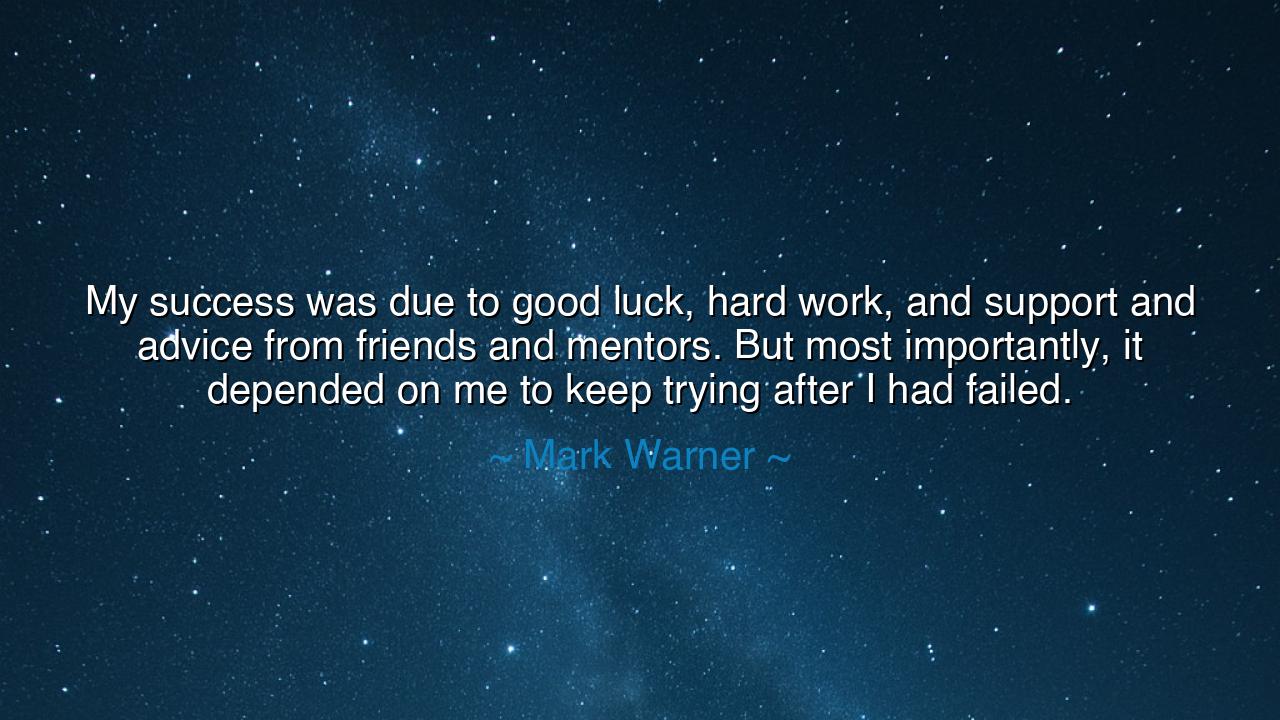
My success was due to good luck, hard work, and support and
My success was due to good luck, hard work, and support and advice from friends and mentors. But most importantly, it depended on me to keep trying after I had failed.






Hear the words of Mark Warner, spoken with honesty and the humility of one who has wrestled with both triumph and defeat: “My success was due to good luck, hard work, and support and advice from friends and mentors. But most importantly, it depended on me to keep trying after I had failed.” In this confession lies the true anatomy of success, stripped of illusions and pride. It is never born of one force alone, but of many threads woven together: chance, labor, guidance, and above all, persistence in the face of failure.
To speak of good luck is to acknowledge the mystery that no man commands entirely. The timing of opportunities, the chance encounters, the open doors—these belong not to our planning but to fate. Yet luck alone is never enough. It is but a seed cast upon the soil; without hard work, without the tending of sweat and effort, the seed withers. Warner reminds us that effort is the companion of fortune, and that those who labor diligently are prepared when luck finally arrives.
But beyond luck and effort, he names another source of strength: the support and advice of friends and mentors. Here lies a truth often forgotten—that no man climbs to greatness alone. The counsel of elders, the encouragement of peers, the unseen kindness of those who stand beside us, all are part of the foundation of success. Just as a tree is nourished by the unseen roots beneath the soil, so too is every human achievement upheld by the wisdom and aid of others.
History offers us countless witnesses to this truth. Consider Abraham Lincoln, who suffered repeated failures in politics and business. He endured defeats that might have crushed a weaker man. Yet he leaned on the counsel of mentors, drew strength from loyal friends, and continued to rise after each fall. His eventual success, guiding a divided nation through its darkest hour, was not the fruit of luck or labor alone, but of his refusal to stop trying when failure seemed to have the final word.
Or recall Thomas Edison, whose pursuit of the electric light was littered with thousands of failed experiments. Many laughed, many doubted. But Edison declared, “I have not failed. I’ve just found 10,000 ways that won’t work.” This is the very spirit Warner describes—the relentless choice to keep moving forward after failure. For in truth, it is not failure itself that defeats us, but the surrender that often follows. To keep trying is the most heroic act of all.
The meaning of Warner’s words is thus: success is a tapestry. Luck provides threads, hard work weaves them, mentors guide the hand, but persistence alone ensures the cloth is finished. Without the will to rise after failure, all else is wasted. Persistence is the hinge upon which destiny turns. Those who endure long enough will outlast failure, outlast doubt, and claim the victories denied to those who surrendered too soon.
The lesson for us, O seeker, is radiant and strong: do not despise the role of luck, nor neglect the duty of work, nor ignore the wisdom of others. But above all, cultivate resilience. When you fall—and you will—do not linger in the dust. Rise, gather yourself, and try again. For each return to the path builds a strength greater than success itself. The world does not belong to the flawless, but to the steadfast.
Thus, let Warner’s words echo across your heart: “Most importantly, it depended on me to keep trying after I had failed.” This is the secret law of triumph. Fortune may waver, friends may falter, efforts may seem wasted—but the one who keeps walking, who keeps striving, who keeps rising from defeat, cannot be conquered. In this truth lies your own key to greatness.






AAdministratorAdministrator
Welcome, honored guests. Please leave a comment, we will respond soon